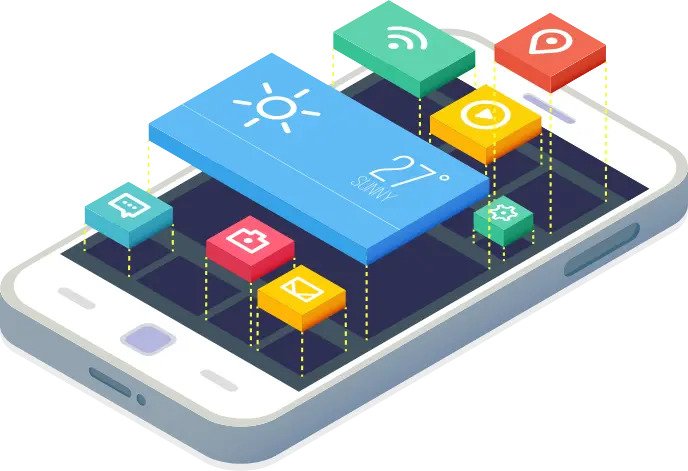The first thing that you might think of when deciding to develop your iOS app is undoubtedly the development language. Considering native iOS mobile app development, we have two choices i.e. Objective-C, which is the ‘old is gold’ one, or Swift, which is the advanced, next-generation language.
But, to choose the best programming language for your iOS app development, you first need to understand their characteristics, features, advantages, and disadvantages of both the language options that you have in hand. In this blog post, we have listed all the major features, and pros & cons of Objective-C and Swift that will help you choose over the ideal amid them for your iOS app.
Fundamental Characteristics and Features of Objective-C & Swift
Objective-C
Objective-C has been originated as an extension of the C language and it was invented by Tom Love and Brad Cox in the 1980s. Objective-C received an amazing response when it got first released in the market in 1988. During the late 1980s, NeXT Computer Inc. purchased a license for the language for using it to develop an official framework for NeXTStep, which was then acquired by Apple Inc. In this way, we can say that Objective-C has been managing to be a standard language for so long, especially when it comes to iOS app development.
Objective-C is originally the blend of two languages i.e. C and Smalltalk, which makes it a language with complex and extensive syntax. The non-object and object syntax with the language has come from C and Smalltalk respectively. Apple Inc. has also appreciated the fact that Objective-C comes with dynamic runtime and object-oriented capabilities. Dynamic tapping and message passing are also used by Objective-C. And, the code blocks of interface and implementation are also needed in such case for dividing classes.
Swift
In terms of age, Swift is quite younger than Objective-C. Apple began developing it in 2010, and it got released into the market in 2014. Later in 2015, Swift was made an open-source platform, and it very rapidly embraced the advanced programming features, leaving Objective-C way behind in terms of modernization and advancement. So, with Swift, you will find optional, type interference, generics, and various other higher-order functions.
Swift is fully compatible with iOS, tvOS, and macOS. Additionally, there are a lot of similarities between Swift and Objective-C including dynamic dispatch, late binding, and extensible programming, etc. while also being capable of determining and addressing the Null Pointers. Swift 2.0 was released to the market in 2015, and apart from being compatible with iOS, it is also compatible with Linux. Furthermore, the mobile device market is anticipated to worth $165 billion by the end of 2023, which means that Swift is also going to play a crucial role as a programming language for iOS development, because of its modernized features, concise and modern concepts, simplified syntax and interactive environment for development.
App Development Speed of Objective-C & Swift
Features that come along with programming language are crucial to ensure the fact that you can attain the desired app development speed. Amid Objective-C and Swift, the latter is swifter when it comes to development speed. Using generics and high-order functions helps to develop much cleaner and reusable codes. The types of interference options that are available also ensure the safety of the code during their transfer from programmer to compiler. Additionally, the syntax of Swift is also very concise and it does not require making two separate code blocks for class interface and implementation. This simply means that the programmer does not require to write unnecessarily lengthy codes in Swift as compared to Objective-C, which unfortunately requires to do so.
The Pros & Cons of Objective-C & Swift
Being a mobile app development company, Code Creators Inc. specializes in developing an app with both Swift as well as Objective-C.
Undoubtedly, Swift is the better choice if you want to develop your app faster, but this is not the end-all and be-all of the decision while choosing the ideal programming language for your iOS app development. Hence, it is very important to take a look at all the pros and cons that both languages offer.
Pros of Objective-C
- Tried & Tested: Objective-C has been one of the most widely used programming languages for iOS development and it has been utilized for writing millions of codes since its origination. Thanks to the third-party frameworks and existence of documentation, with Objective-C you can easily get the answer to each of your questions and concern.
- Dynamic Tapping: Objective-C comes with an amazing feature of Dynamic Tapping which makes the environment very flexible for development. Hence, the developer can make the desired changes at any stage and segment of development.
- Add-Ons & Binary Framework Support: Objective-C effectively supports add-ons and binary frameworks. Furthermore, it has been over 30 years which makes it a very stable programming language.
- Compatibility with C & C++: Objective-C is in actual a super-set that is made up of different programming languages, which is what makes it work smoothly for both C and C++ codes.
- Stability: Any application developed in Objective-C does not require you to spend any additional money to take it to any new language.
Cons of Objective-C
- Difficult to Learn: Objective-C is significantly different from many programming languages. Objective-C’s memory management is very complex; hence is the developer is familiar with Objective-C, then he can easily learn and work on Swift because learning Objective-C is the actual challenge.
- Decreasing Number of Supporters: Facing the difficulties in learning Objective-C, modern-age developers are much keener to learn Swift. On the other hand, experienced developers who have complete knowledge about Objective-C may find Swift very easy to learn. This is why a steady stream of developers is observed to migrate from Objective-C to Swift.
- Reverse Engineering Tools: iOS apps developed using Objective-C is at ease to get hacked as compared to the ones developed using Swift. Since Objective-C has been with us for so long, its reverse engineering tools are quite sharp too.
- Complex Syntax: It comes with a complex syntax with problems like Block Syntax. Since it is Dynamic, debugging becomes difficult.
Pros of Swift
- Safety & Security: Swift offers a wide range of features which include everything from type interferences, generics to optional which makes Swift quite sturdy and strong enough to prevent any easy crashes or bugs as compared to Objective-C. Additionally, Objective-C has turned out to be more efficient for writing error-free code writing.
- Performance: Swift is matchless when it comes to speed and high-performance. It is because it uses both enhanced memory and object-oriented management without any garbage collection.
- Memory Allocation: Swift utilizes Automatic Reference Counting (ARC) which helps to track apps’ memory usage. In traditional languages like Objective-C, it is the developer’s responsibility to track the memory allocation manually.
- Apple is Swift-Centric: For Swift, since Apple Inc. has developed it, it is also providing the community with constant support. Moreover, what iOS developers are raving about these days is the advanced features and technicalities of Swift, which shows that why this language needs all the attention.
- Swift is Not Going Anywhere Sooner: Recent survey shows that Swift is by far one of the most widely used programming languages for iOS development, significantly shadowing Objective-C’s place.
Cons of Swift
- Changes and Migrations: Swift’s weakest link in the migration and change associated with it. Although, it is not as difficult as it used to be, there are changes there for further improvement after ABI’s stability introduction. Constant changes made to the language were the main issues earlier because the developers had to switch to the latest version which cost them both time and money. However, a good thing about Swift is that the subsequent versions that were released to the market are better and stronger than before.
- C++ Usage: There is no doubt about the fact that Swift cannot handle the direct usage of the C++ libraries within it.
Which One to Choose? Swift Vs Objective-C – Simplified
Performance
Apple Inc. itself has agreed on the fact that Swift is 2.6 times faster as compared to Objective-C. Nevertheless, many reports also claim that there is a minor difference in their development speed. Furthermore, both the languages use the same SDK and iOS together with the Low-Level Machine Compiler.
Maintenance
Compared to Swift, maintenance has been a complicated task when it comes to Objective-C because developers are required to manage two separate files. On the other hand, maintenance is hassle-free and seamless for Swift.
Security & Safety
Swift is a safe language when it comes to typing and memory which reinforces security further within it. Along with that, Swift has a very clear code that can rarely be misunderstood. Thus, developers can quickly identify and correct the errors as compared to Objective-C.
Coding Complexity
Code’s complexity is one of the most significant factors when it comes to a programming language. With Swift, coding is way easier and can be achieved with a very few number lines. However, the case is not the same with Objective-C because its long code often leads to the app crashing.
Developer Usage
Since Swift is still blooming, people are now starting to learn and implement the new language. Additionally, there are few complexities such as less expertise and maturity, etc. that are making developers still linger along with Objective-C.
Conclusion
Summing up the entire discussion above, we would say that Swift is ideal when it comes to small and latest iOS applications. However, if your iOS app project is larger, then Objective-C will be best-suited because it comes already with an extensive code base, where Swift may get obstructed. Being said that, Swift is advancing remarkably and the majority of its serious glitches have been addressed, which makes it the best programming language for iOS app development.


